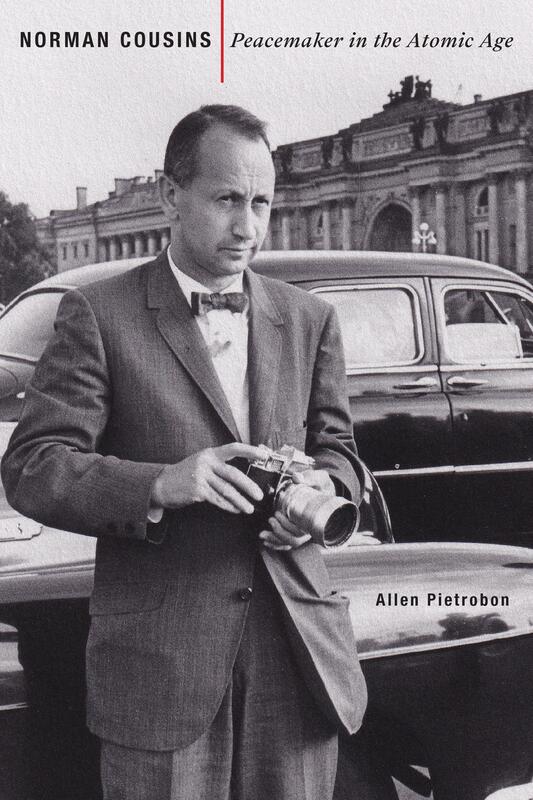
ORDER HERE!
Norman Cousins: Peacemaker in the Atomic Age, (published October 2022,) examines the life and achievements of Norman Cousins (1915-1990.) He is probably most well known today as the long-time editor of the influential American weekly magazine Saturday Review. For a time in the 1960s, Saturday Review was the third most popular news magazine in the country after Time and Life. Cousins was also a leading humanitarian, peacemaker, and anti-nuclear activist who contributed to a wide array of anti-war causes and diplomatic efforts. Cousins’s life charts the Cold War. He first rose to widespread public attention eleven days after the first use of the atomic bomb with his groundbreaking article “Modern Man is Obsolete.” He would pass away in November 1990, just a year after the Berlin Wall fell, and 13 months before the Soviet Union collapsed. This book highlights the outsized impact that one individual had on the course of American public debate, international humanitarianism, and citizen diplomacy during the Cold War.
Cousins managed to build a vast network of far-reaching high-level personal and political connections over the years, which allowed him to exert influence in the highest halls of power across the globe, despite being a political “outsider.” He never held elected or appointed office (although he was offered a job in the Kennedy White House), but many at the time thought that Cousins’s intellect, charm, and growing prominence would one day carry him to the White House as president himself. Two exploratory committees attempted to draft him for presidential campaigns in the 1960s and 1970s. Despite never becoming the leader of the free world, his lifelong activities did in fact have an outsized impact on domestic politics and international relations.
Norman Cousins: Peacemaker in the Atomic Age, (published October 2022,) examines the life and achievements of Norman Cousins (1915-1990.) He is probably most well known today as the long-time editor of the influential American weekly magazine Saturday Review. For a time in the 1960s, Saturday Review was the third most popular news magazine in the country after Time and Life. Cousins was also a leading humanitarian, peacemaker, and anti-nuclear activist who contributed to a wide array of anti-war causes and diplomatic efforts. Cousins’s life charts the Cold War. He first rose to widespread public attention eleven days after the first use of the atomic bomb with his groundbreaking article “Modern Man is Obsolete.” He would pass away in November 1990, just a year after the Berlin Wall fell, and 13 months before the Soviet Union collapsed. This book highlights the outsized impact that one individual had on the course of American public debate, international humanitarianism, and citizen diplomacy during the Cold War.
Cousins managed to build a vast network of far-reaching high-level personal and political connections over the years, which allowed him to exert influence in the highest halls of power across the globe, despite being a political “outsider.” He never held elected or appointed office (although he was offered a job in the Kennedy White House), but many at the time thought that Cousins’s intellect, charm, and growing prominence would one day carry him to the White House as president himself. Two exploratory committees attempted to draft him for presidential campaigns in the 1960s and 1970s. Despite never becoming the leader of the free world, his lifelong activities did in fact have an outsized impact on domestic politics and international relations.
Norman Cousins made his life his argument:
